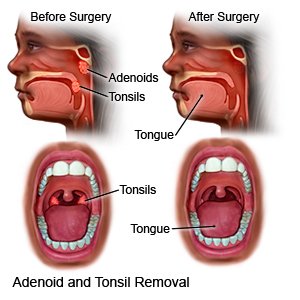Tonsillectomy in Children
Medically reviewed by Drugs.com. Last updated on Aug 4, 2025.
What do I need to know about a tonsillectomy?
A tonsillectomy is surgery to remove your child's tonsils. Your child may need this surgery if he or she gets tonsillitis several times each year. The surgery may also be needed if your child has obstructive sleep apnea or tonsil cancer.
 |
How do I prepare my child for a tonsillectomy?
- Your child's surgeon will tell you how to prepare. You may be told not to let your child eat or drink anything after midnight before surgery. Your child may instead be able to have clear liquids until a few hours before surgery. Examples include water, clear juices (such as apple), and tea without cream or milk.
- Tell your child's surgeon about all the medicines your child currently takes. The surgeon will tell you if you need to stop any of your child's medicines for surgery, and when to stop. The surgeon will tell you which medicines to give or not give your child on the day of surgery.
- Tell your child's surgeon about all of your child's allergies. Tell the surgeon if your child has had an allergic reaction to anesthesia or any other medicines.
- Tell the surgeon if your child has a bleeding disorder or a family history of bleeding disorders.
Related medications
What will happen during my child's tonsillectomy?
- Your child will be given general anesthesia to keep him or her asleep and free from pain during surgery. Your child will also be given medicine to help prevent nausea and vomiting.
- The surgeon will place tools inside your child's mouth to keep it open. All or part of your child's tonsils will be removed.
- The surgeon will stop any bleeding from the areas where the tonsils were removed.
What should I expect after my child's tonsillectomy?
- Your child may need to stay in the hospital if he or she is younger than 3 years. Your child may also need to stay overnight if he or she has breathing or other health problems.
- Your child will have throat pain that may last up to 2 weeks. The pain may be worse in the morning and spread to his or her ears. It may hurt for your child to swallow. He or she may not feel like eating or drinking.
- Your child will have white patches in the back of his or her throat. These are scabs that will fall off after about a week.
What are the risks of tonsillectomy?
Your child may bleed more than expected or get an infection. He or she may have mouth, throat, or lung swelling that makes it hard to breathe. Your child may have nausea and vomiting after surgery. Your child may have changes in his or her voice or sense of taste after surgery. Your child may continue to have sleep apnea even after surgery. Tools used to remove your child's tonsils may cause injury to his or her teeth, voice box, or palate. Tools that use heat or a laser to remove his or her tonsils can cause a burn. Your child's tonsils could grow back after surgery.
Care Agreement
You have the right to help plan your child's care. Learn about your child's health condition and how it may be treated. Discuss treatment options with your child's healthcare providers to decide what care you want for your child. The above information is an educational aid only. It is not intended as medical advice for individual conditions or treatments. Talk to your doctor, nurse or pharmacist before following any medical regimen to see if it is safe and effective for you.© Copyright Merative 2025 Information is for End User's use only and may not be sold, redistributed or otherwise used for commercial purposes.
Further information
Always consult your healthcare provider to ensure the information displayed on this page applies to your personal circumstances.
